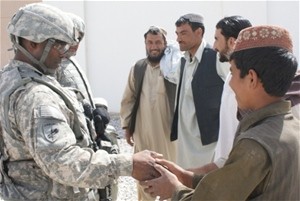
Maj. Joseph Roberts of the U.S. Army 42nd Cavalry meets with AVIPA Plus engineers, village elders, and members of the Joint District Coordination center in Spin Boldak.
IRD/AVIPA Plus
Military support bolsters USAID-funded programs that provide alternatives to would-be insurgents.
11 OCTOBER 2010 | LOY KAREZ, AFGHANISTAN
An army tank is a formidable presence in the quiet village of Loy Karez in southern Afghanistan. As its engine rumbles to a halt and the dust settles, children flock to the tank from nearby houses, giving the dismounting soldiers the thumbs-up.
“That’s a good sign,” says Major Joseph Roberts of the U.S. Army as his troops fan out across the street. “Kids know when there’s trouble. When you don’t see any kids, you start to worry.”
The patrol’s objective is the Joint District Coordination Center, where Major Roberts sits down with two men whose faces betray the tension of a longstanding dispute. One is an engineer for Afghanistan Vouchers for Increased Production in Afghanistan Plus (AVIPA Plus), a USAID-funded program. He is trying to start a Cash for Work project here that would employ hundreds of village laborers to rehabilitate the local canal. The other is Hajji Omar, the village elder, who wants to be sure that word will be fairy distributed to members of all local tribes.
Arbitrating discussions like this is not what Roberts thought he’d be doing as part of his army service in Afghanistan, and yet it’s central to the military’s counter-insurgency objective here. “If you give people an alternate means of employment, like USAID’s Cash for Work, it takes them away from the insurgency,” he says. “That’s what we’re pushing for.”
At the end of an hour, the AVIPA Plus engineer and the elder have come to an understanding. Their argument turns out to be the result of unfounded village gossip. Their relief is visible as they shake hands. “With good communication we can always work things out,” Major Roberts tells those around him.
It’s all in a day’s work for Major Roberts and his troops, who pile back into the tank and return to base. The troops are part of the changing face of the war in Afghanistan, a war where negotiation counts as much as weaponry and where USAID projects like AVIPA Plus are helping to create a more stable Afghan society and are improving the quality of life for local villagers in tangible ways.







Comment
Make a general inquiry or suggest an improvement.